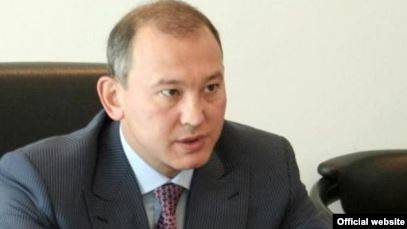Kazakhstan frees prominent prisoner after decade in jail

Stay tuned with 24 News HD Android App

A court in Kazakhstan on Tuesday freed the former head of the world's largest uranium producer, who is one of the country's best-known political prisoners, after a decade behind bars.
Mukhtar Djakishev, 56, who led the state uranium giant Kazatomprom for over 10 years prior to his arrest on embezzlement charges in 2009, was considered a political prisoner by international rights groups.
The decision by a court in the northeastern city of Semey to release Djakishev with less than four years of his 14-year sentence remaining came after appeals for early release were rejected last year and in 2018.
"The court decided to satisfy the request of the convict M.E. Djakishev for early conditional release," said judge Zhanat Abenova, to whoops and cheers from supporters in the courtroom during proceedings broadcast live on Facebook.
Djakishev's legal team has argued that he is seriously ill and requires urgent medical attention.
Oil-rich Kazakhstan ignored a demand for his immediate release from the United Nations Human Rights Committee in 2015.
Yevgeny Zhovtis, director of the Kazakhstan International Bureau for Human Rights and Rule of Law, called the release of Djakishev a "political decision", taken as new Kazakh President Kassym-Jomart Tokayev "tries to position himself as a reformer."
"There were a lot of factors at work here. The different centres of power in the political leadership came to a consensus," he told AFP, referring to Tokayev's administration and the team surrounding his long-ruling predecessor Nursultan Nazarbayev.
"There was domestic pressure. Long-standing international pressure. There was a realisation that this case was damaging the country's international image," Zhovtis said.
Djakishev's tenure in charge of Kazatomprom saw the company emerge as a leading player on the international uranium market.
Many believe that he paid the price for his close ties to Mukhtar Ablyazov, a former banker and energy minister who fled the country in 2009 during a struggle over a bank that Ablyazov chaired.
Ablyazov subsequently waged a struggle against the Kazakh regime from abroad, while his supporters and Kazakh civil society groups have continued to champion Djakishev's case.
Tokayev, 66, will mark a year in office this month, after he took over following the shock resignation of Nazarbayev, 79, who served for close to three decades in the role.
After Tokayev's subsequent election in June, thousands were detained during protests.
Last month, his promises of reform were undermined by the death in detention of an activist, which brought hundreds onto the streets in the capital Nur-Sultan and the largest city Almaty, triggering scores of arrests
Nazarbayev is still widely believed to call the shots in the republic of 18 million people and has retained his roles as chair of the nation's ruling party and lifelong head of the powerful security council.
